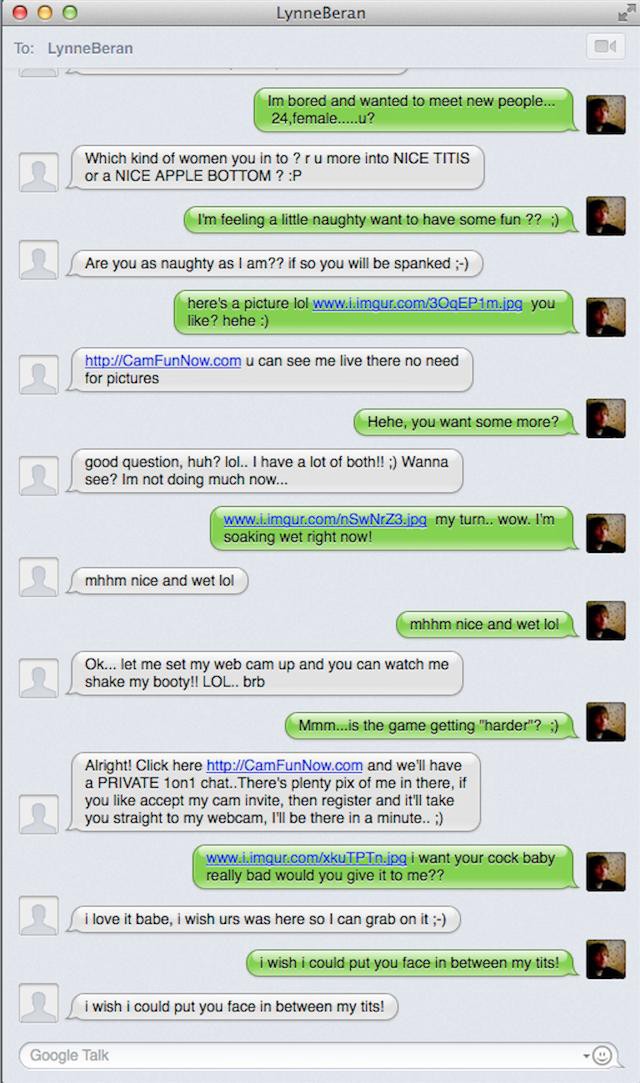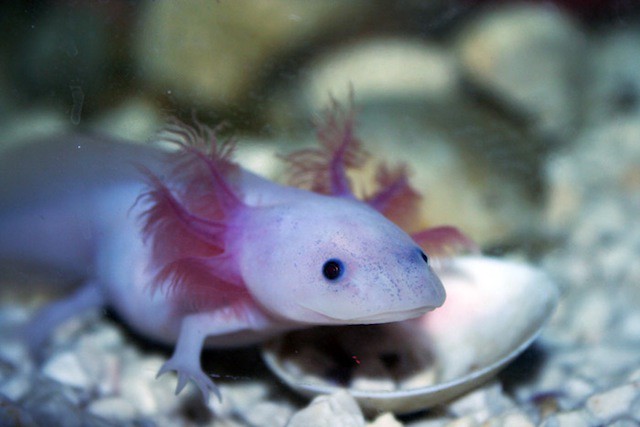Finally, A Millennial Stands Up For His Generation
“Millennials are entitled, narcissistic, and lazy — you’ve heard this all before.”
— I would have stopped it right there, but this guy has more to say, I guess.
How To Make Cyber Sex With Lonely Twitter Sexbots
by Matthew J.X. Malady
People drop things on the Internet and run all the time — so we have to ask. In this edition, Venus Patrol founder and IGF chairman Brandon Boyer tells us more about a recent Saturday night sexbot experiment for the ages.
last night i “fed” the lonely sexbots to each other just to see if it would ever reach a logical conclusion: pic.twitter.com/afY8pKGJ0H
— Brandon Boyer (@brandonnn) January 22, 2014

Brandon! So what happened here?
So, I have a pretty unfortunate pattern of blithely agreeing to everything without really thinking through the ramifications, and this extends into me accepting basically any iMessage chat request that blips up on my screen. In most cases, it’s friendly aspiring indie game devs who want to get me excited about what they’re making, and in a bunch of other cases it’s really lonely, emotionally needy sexbots.
I got hit up by two of those bots at once earlier in January and was doing an OK job of ignoring their advances, but it was becoming clear that they had something they desperately needed to tell me, even after they axed their provocative user icons.
bots get lonely too pic.twitter.com/F8YB6lESvj
— Brandon Boyer (@brandonnn) January 21, 2014

My dad used to do this thing in the early 80s on our first computer where he’d try to have a human conversation with a BASIC parser (“Hello!” >> SYNTAX ERROR “I’m sorry! What’s a syntax error?” >> SYNTAX ERROR “No, I mean can you explain what one is?” >> SYNTAX ERROR), which I still think is basically the height of computercomedy 30 years later. And we’ve all by now goofed around with trying to make ELIZA or Siri say unexpected things. But I thought it’d be more interesting to see what happened if you locked two lonely, worked-up sexbots in a room together.
Absent any real technical prowess (and without wanting to pester my pal Zach, who’s done some super interesting conceptual work around IM/chat and bots), and without trying to inflate the importance of what I did any further: What happened was one Saturday night I sat down and started copying/pasting the responses of one sexbot into the window of the other to see if we could spark some fireworks — a lot of which is what you can read there.
I don’t mean to pry, but I would be remiss if I didn’t ask why you have these sexbots available at your disposal. If it’s something embarrassing, or devious, or felonious, feel free to just make up some seemingly reasonable, innocuous reason. I won’t press you on it. But… what’s going on here?
I wish I had a better answer than “I honestly don’t know” — which I totally can say while looking you straight in the eyes! But even though these two had their way with me/each other and never even bothered to IM the next day to say they had a nice time, it is happening… again…

Lesson learned (if any)?
The most interesting part for me was learning that AIM sexbots are set up to try and tell a complete and compelling story. It’s clear — from the times when their responses collided — that even though “lynneberan” and “wmoad50” “worked at different websites,” they both come from a common source (I would super legitimately love to know who writes this code!), and they both tried to follow the same narrative arc. That is: overeager and lonely/bored 20-something girl chats up unwitting stranger, instantly “feels a little naughty,” tries to engage in a little sexy banter, but quickly gets so overwhelmed that they need to rush to their conveniently adjacent cam-girl setup to continue the conversation there, and then, regrettably, has to spend a few cycles having an honestly-sort-of mood-killing dialogue about how you shouldn’t worry about that whole “putting in your credit card number” thing, and then they’re out. Like, so out that even after that flurry of hellos and ;-)s for weeks, they both stopped talking to me altogether.
My only regret is that I think I actually may not have done the algorithms justice by getting a bit too straight to the point, and glossed straight past a bunch of branches of their dialogue trees. The bit where “I” invited one to join “my” cam-girl site and she responded by saying “miami” makes me think there’s probably a whole load of “no I actually am a real live girl” conversation I could’ve spun through if both bots weren’t so desperate to Get Things Going.
Just one more thing.
My pal Zane had the funniest final word on the whole thing…
@brandonnn you’re walking through the desert and come upon a tortoise. do you wish you could put you face between its tits?
— Mr. Darcy (@TrainBrzezinski) January 22, 2014
…which I can’t really compete with. But while we’re all on the same page, I also wanna plug my pal Rob Dubbin’s New York Review of Bots blog (“a professional journal of automated-agent studies”), which catalogs a lot of the best advances happening in the Twitter-bot sphere — work far above and beyond a dumb dude cutting and pasting sex chat IMs. (Not coincidentally, Rob also gave birth to @oliviataters, who is for sure my favorite disaffected teen-girl bot on all of Twitter.) Oh, and also, have you ever heard this amazing Voight-Kampff conversation with a telemarketer bot?
Those pregnant pauses! Man, we’re so right at the cusp of a really fantastic future for bot interaction of all proclivities.
Matthew J.X. Malady is a writer and editor (and human) in New York.
Crow Carnage In Canyon County Ruffles Feathers
Police officers from Caldwell, Idaho, are facing criticism for not properly disposing of the corpses of the crows they have shot to death in the line of duty. On the days when I feel as though I have finally had enough of this city and it is time for me to move somewhere more sedate and less congested it is incredibly helpful to see stories like this that let me know what the rest of the country is actually like. Don’t make me go there, I promise I’ll be good.
Caffeine Is Lies And Empty Promises
Here is a nightclub bouncer analogy that should help you understand how caffeine works.
Bizarre Perma-Tadpole Axolotl Now Extinct in the Wild

Every five years, scientists take a survey of the axolotl in ancient Lake Xochimilco, in southern Mexico City, the only place in the world where the amphibian still lives. In 1998 there were 6,000. In 2003 there were 1,000. In 2008 there were 100. And in 2013 there were 0. RIP axolotl, you delightful primitive weirdo.
The axolotl is a salamander, but a salamander that never undergoes metamorphosis from its tadpole stage to its adult stage, much like the millenial generation, am I right, sorry, jesus, that was awful, back to the axolotl. Neglecting to undergo metamorphosis means the axolotl demonstrates neoteny, which, creepily, refers to an animal that reaches sexual maturity without the need for a transformative maturing process like puberty. It looks mostly like an enormous tadpole, except with a few spindly useless limbs and goofy delicate external gill stalks. It can breathe air, sort of (it swallows it and pushes it through its gill stalks), but doesn’t, mostly.
It’s also all gone, in the wild. Since it’s such a weird animal, it’s no surprise that it needs a very specific sort of habitat: high-elevation freshwater lakes. Until, you know, it wasn’t, it was restricted to only Lake Xochimilco, which has been steadily drained to reduce flooding and now more resembles a bunch of canals than an enormous lake. The Mexican Academy of Sciences, which conducts these bi-decade studies, says it’s a little premature to declare it extinct in the wild, despite the fact that their study turned up not a single wild axolotl, and will embark on some quick new searches to attempt to find any stragglers.
The axolotl does survive in captivity, though. It has the ability to regrow limbs, which has proven fascinating for a generation of scientists reared on comic books (just kidding, scientists, do your research, it’s very good), and the axolotl’s general weirdness has made it a staple in the pet trade. There are some breeding and reintroduction programs, but, well, it’s hard to reintroduce an animal to a habitat that doesn’t really exist anymore. Anyway, so long, axolotl. You had a good run.
Photo by Orizatriz
How Much More Would You Pay To Feed Your Crippling Amazon Prime Addiction?
“For those loyal customers who have gotten addicted to two-day shipping, an additional $20 is a small price to pay in order to feed that need.”
Start Reading 'A Constellation of Vital Phenomena'
by Awl Sponsors

Anthony Marra’s debut novel A Constellation of Vital Phenomena was an instant New York Times bestseller and was named one of the Best Books of 2013 by dozens of booksellers and book reviews, including Amazon, Barnes & Noble, National Public Radio, and The New York Times.
In anticipation of the book’s February 4, 2014 paperback release, we’re delighted to present the full first chapter for your reading enjoyment.
A Constellation of Vital Phenomena is available in paperback February 4, 2014 wherever books are sold.
2004
On the morning after the Feds burned down her house and took her father, Havaa woke from dreams of sea anemones. While the girl dressed, Akhmed, who hadn’t slept at all, paced outside the bedroom door, watching the sky brighten on the other side of the window glass; the rising sun had never before made him feel late. When she emerged from the bedroom, looking older than her eight years, he took her suitcase and she followed him out the front door. He had led the girl to the middle of the street before he raised his eyes to what had been her house.
“Havaa, we should go,” he said, but neither moved.
The snow softened around their boots as they stared across the street to the wide patch of flattened ash. A few orange embers hissed in pools of gray snow, but all else was char. Not seven years earlier, Akhmed had helped Dokka build an addition so the girl would have a room of her own. He had drawn the blueprints and chopped the hardwood and cut it into boards and turned them into a room; and when Dokka had promised to help him build an addition to his own house, should he ever have a child, Akhmed had thanked his friend and walked home, the knot in his throat unraveling into a sob when the door closed behind him.
Carrying that lumber the forty meters from the forest had left his knuckles blistered, his underarms sopping, but now a few hours of flames had lifted what had taken him months to design, weeks to carry, days to build, all but the nails and rivets, all but the hinges and bolts, all into the sky. And too were carried the small treasures that had made Dokka’s house his own.
There was the hand-carved chess set on a round sidetable; when moved, the squat white king wobbled from side to side, like a man just sober enough to stand, and Dokka had named his majesty Boris Yeltsin. There was the porcelain vase adorned with Persian arabesques, and beside that a cassette deck-radio with an antenna long enough to scrape the ceiling when propped up on a telephone book, yet too short to reach anything but static. There was the eighty-five-year-old Qur’an, the purple cover writhing with calligraphy, that Dokka’s grandfather had purchased in Mecca. There were these things and the flames ate these things, and since fire doesn’t distinguish between the word of God and the word of the Soviet Communications Registry Bureau, both Qur’an and telephone directory returned to His mouth in the same inhalation of smoke.
The girl’s fingers braceleted his wrist. He wanted to throw her over his shoulder and sprint northward until the forest swallowed the village, but standing before the blackened timbers, he couldn’t summon the strength to bring a consoling word to his lips, to hold the girl’s hand in his own, to move his feet in the direction he wanted them to go.
“That’s my house.” Her voice broke their silence and he heard it as he would the only sound in an empty corridor.
“Don’t think of it like that,” he said.
“Like what?”
“Like it’s still yours.”
He wound her bright orange scarf around her neck and frowned at the sooty fingerprint on her cheek. He had been awake in bed the previous night when the Feds came. First the murmur of a diesel engine, a low rumble he’d come to fear more than gunfire, then Russian voices. He had gone to the living room and pulled back the blackout curtain as far as he dared. Through the triangle of glass, headlights parted the night. Four soldiers, stocky, well fed, emerged from the truck. One drank from a vodka bottle and cursed the snow each time he stumbled. This soldier’s grandfather had told him, the morning the soldier reported to the Vladivostok conscription center, that he would have perished in Stalingrad if not for the numbing grace of vodka; the soldier, whose cheeks were divoted from years of applying toothpaste to his adolescent acne, believed Chechnya to be a worse war than Stalingrad, and rationed his vodka accordingly.
From his living room Akhmed wanted to shout, beat a drum, set off a flare. But across the street, they had already reached Dokka’s door and he didn’t even look to the phone that was without a pulse for ten years now. They knocked on the door once, twice, then kicked it down. Through the doorway, Akhmed watched torchlight move across the walls. So passed the longest two minutes of Akhmed’s life until the soldiers reappeared in the doorway with Dokka. The duct tape strip across his mouth wrinkled with his muted screams. They pulled a black hood over his head.
Where was Havaa? Sweat formed on Akhmed’s forehead. His hands felt impossibly heavy. When the soldiers grabbed Dokka by the shoulders and belt, tumbling him into the back of the truck and slamming the door, the relief falling over Akhmed was quickly peeled back by self-loathing, because he was alive, safe in his living room, while in the truck across the street, not twenty meters away, Dokka was a dead man. The designation 02 was stenciled above the truck bumper in white paint, meaning it belonged to the Interior Ministry, meaning there would be no record of the arrest, meaning Dokka had never officially been taken, meaning he would never come back.
“Where’s the girl?” the soldiers asked one another.
“She’s not here.”
“What if she’s hiding beneath the floorboards?”
“She’s not.”
“Take care of it just in case.”
The drunken soldier uncapped a petrol jug and stumbled into Dokka’s house; when he returned to the threshold, he tossed a match behind him and closed the door. Flames clawed their way up the front curtains. The glass panes puddled on the sill. Where was Havaa? When the truck finally left, the fire had spread to the walls and roof. Akhmed waited until the taillights had shrunk to the size of cherries before crossing the street. Running a wide circle around the flames, he entered the forest behind the house. His boots broke the frigid undergrowth and he could have counted the rings of tree stumps by the firelight. Behind the house, hiding among the trees, the girl’s face flickered. Streaks of pale skin began under her eyes, striping the ash on her cheeks.
“Havaa,” he called out.
She sat on a suitcase and didn’t respond to her name. He held her like a bundle of loose sticks in his arms, carried her to his house and with a damp towel wiped the ash from her forehead. He tucked her in bed beside his invalid wife and didn’t know what to do next. He could have gone back outside and thrown snowballs at the burning house, or lain in bed so the girl would feel the warmth of two grown bodies, or performed his ablutions and prostrated himself, but he had completed the isha’a hours earlier and if five daily prayers hadn’t spared Dokka’s house, a sixth wouldn’t put out the flames. Instead he went to the living room window, drew open the blackout curtains, and watched the house he had helped build disappear into light. And now, in the morning, as he tightened the orange scarf around her neck, he found a fingerprint on the girl’s cheek, and, because it could have been Dokka’s, he left it.
“Where are we going?” she asked. She stood in the frozen furrow of the previous night’s tire tracks. The snow stretched on either side. Akhmed hadn’t prepared for this. He couldn’t imagine why the Feds would want Dokka, much less the girl. She stood no taller than his stomach and weighed no more than a basket of firewood, but to Akhmed she seemed an immense and overwhelming creature whom he was destined to fail.
“We’re going to the city hospital,” he said, with what he hoped was an assertive tone.
“Why?”
“Because the hospital is safe. It’s where people go when they need help. And I know someone there, another doctor,” he said, though all he knew of her was her name. “She’ll help.”
“How?”
“I’m going to ask if you can stay with her.” What was he saying? Like most of his plans, this one seemed so robust in his mind but fell like a flightless bird when released to the air. The girl frowned.
“He’s not coming back, is he?” she asked. She focused on the blue leather suitcase that sat on the street between them. Eight months earlier, her father had asked her to prepare the suitcase and leave it in the closet, where it had remained until the previous night, when he thrust it into her hands and pushed her out the back door as the Feds broke through the front.
“I don’t think so.”
“But you don’t know?” It wasn’t an accusation, but he took it as one. Was he so incompetent a physician that she hesitated to trust him with her father’s life even in speculation? “We should be safe,” he said. “It’s safer to think he won’t come back.”
“But what if he does?”
The longing knotted into such a simple question was more than he could contemplate. What if she cried? It suddenly seemed like a terrifying possibility. How would he stop her? He had to keep her calm, keep himself calm; panic, he knew, could spread between two people more quickly than any virus. He fiddled with her scarf. Somehow it had survived the fire as orange as the day it was pulled from the dye. “How about this: if he comes back, I’ll tell him where you are. Is that a good idea?”
“My father is a good idea.”
“Yes, he is,” Akhmed said, relieved they had this to agree on.
They plodded along the Eldar Forest Service Road, the village’s main thoroughfare, and their footprints began where the tire tracks ended. On either side he saw houses by surname rather than address. A face appeared and vanished in an unboarded window.
“Pull your headscarf tighter,” he instructed. But for his years at medical school, he had spent his whole life in Eldar and no longer trusted the traditional clan system of teips that had survived a century of Tsarist rule, then a century of Soviet rule, only to dissolve in a war of national independence. Reincarnated in 1999, after a truce too lawless to be called peace, the war had frayed the village teip into lesser units of loyalty until all but the fidelity of a parent for a child wore thin enough to break. Logging, the village’s sole stable industry, had ceased soon after the first bombs fell, and without viable prospects those who couldn’t emigrate ran guns for the rebels or informed for the Feds to survive.
He wrapped his arm around Havaa’s shoulder as they walked. The girl had always been strong and stoic, but this resignation, this passivity, was something else. She clomped along, kicking snow with each footstep, and in an attempt to cheer her Akhmed whispered a joke about a blind imam and a deaf prostitute, a joke that really wasn’t appropriate for an eight-year-old, but was the only one Akhmed could remember. She didn’t smile, but was listening. She zipped her puffy jacket over a sweatshirt that in Manchester, England, had warmed the shoulders of five brothers before the sixth, a staunchly philanthropic six-year-old, had given it to his school’s Red Cross clothing drive so his mother would have to buy him a new one.
At the end of the village, where the forest narrowed on the road, they passed a meter-tall portrait nailed to a tree trunk. Two years earlier, after forty-one of the villagers had disappeared in a single day, Akhmed had drawn their forty-one portraits on forty-one plywood boards, weatherproofed them, and hung them throughout the village. This one was of a beautiful, self-admiring woman whose second daughter he had delivered. Despite his hounding her for years, she never had paid him for the delivery. After she was abducted, he had decided to draw on her portrait a single hair curling from her left nostril. He had grinned at the vain woman’s ghost and then made peace with it. She looked like a beheaded giantess staring from the trunk. Soon she was no more than two eyes, a nose, and a mouth fading between the trees.
The forest rose around them, tall skeletal birches, gray coils of bark unraveling from the trunks. They walked on the side of the road, where frozen undergrowth expanded across the gravel. Here, beyond the trails of tank treads, the chances of stepping on a land mine diminished. Still he watched for rises in the frost. He walked a few meters ahead of the girl, just in case. He remembered another joke, this one about a lovesick commissar, but decided not to tell it. When she began straggling, he led her five minutes into the woods to a felled log unseen from the road. As they sat down, she asked for her blue suitcase. He gave it to her and she opened it, taking a silent inventory of its contents.
“What’s in there?” he asked.
“My souvenirs,” she said, but he didn’t know what she meant. He unwrapped a hunk of dry black bread from a white handkerchief, split it in two uneven pieces, and gave her the larger one. She ate quickly. Hunger was a sensation so long situated in his abdomen he felt it as he would an inflamed organ. He took his time, tonguing the pulp into a little oval and resting it against his cheek like a lozenge. If the bread wouldn’t fill his stomach, it might at least fill his mouth. The girl had finished half of hers before he took a second bite.
“You shouldn’t rush,” he said. “There are no taste buds in your stomach.”
She paused to consider his reasoning, then took another bite. “There’s no hunger in your tongue,” she mumbled between chews. Her cupped hand caught the crumbs and tossed them back in her mouth.
“I used to hate black bread,” he said. When he was a child he would only eat black bread if it was slathered in a spoonful of honey. Over the course of a year, his mother weaned him from it by slicing larger pieces, until his breakfast consisted of a small, sad oasis of honey on a desert of black bread.
“Can I have yours, then?”
“I said used to,” he said, and imagined a brimming jar of honey, standing on a counter without a breadboard in sight.
She dropped to her knees and examined the underside of the log. “Will Ula be all right alone?” she asked.
His wife wasn’t all right alone, with him, with anyone. He believed she had, in technical terms, lupus coupled with early-onset dementia, but in practice her nerves were so crisscrossed that her elbows ached when she spoke and her left foot had more sense than her brain. Before leaving that morning he had told Ula he would be gone for the day. As she gazed at him through her blank daze, he felt himself as one of her many visions, and he held her hand, and described from memory the placid pasture of a Zakharov oil painting, the herb garden and the cottage, until she fell back asleep. When she woke again that morning would she still see him sitting on the bed beside her? Perhaps part of him was still there, sitting on the bed; perhaps he was something she had dreamed up.
Excerpted from A Constellation of Vital Phenomena by Anthony Marra. Copyright © 2013 by Anthony Marra. Excerpted by permission of Hogarth, a division of Random House LLC. All rights reserved. No part of this excerpt may be reproduced or reprinted without permission in writing from the publisher.

ABOUT THE AUTHOR: ANTHONY MARRA is the winner of a Whiting Award, a Pushcart Prize, and the Narrative Prize. A Constellation of Vital Phenomena was a National Book Award longlist selection as well as a shortlist selection for the Flaherty-Dunnan first-novel prize and a winner for the National Book Critics Circle’s inaugural John Leonard Prize. In addition, his work has been anthologized in The Best American Nonrequired Reading 2012. He received an MFA from the Iowa Writers’ Workshop and was formerly a Stegner Fellow at Stanford University, where he teaches as the Jones Lecturer in Fiction. He has lived and studied in Eastern Europe, and now resides in Oakland, California. A Constellation of Vital Phenomena is his first novel.
